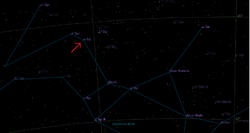Omicron Sagittarii
| Observation data Epoch J2000.0 Equinox J2000.0 | |
|---|---|
| Constellation | Sagittarius |
| Right ascension | 19h 04m 40.98s [1] |
| Declination | −21° 44′ 29.4″ [1] |
| Apparent magnitude (V) | + 3.771[2] |
| Characteristics | |
| Spectral type | K0III |
| Astrometry | |
| Proper motion (μ) | RA: 76.35 ± 0.31 [1] mas/yr Dec.: −58.12 ± 0.18 [1] mas/yr |
| Parallax (π) | 22.96 ± 0.24[1] mas |
| Distance | 142 ± 1 ly (43.6 ± 0.5 pc) |
| Absolute magnitude (MV) | 0.625[2] |
| Details | |
| Mass | 2.14[2] M☉ |
| Surface gravity (log g) | 2.66[2] cgs |
| Temperature | 4,759[2] K |
| Metallicity [Fe/H] | −0.04[2] dex |
| Other designations | |
| Database references | |
| SIMBAD | data |
Omicron Sagittarii (Omicron Sgr, ο Sagittarii, ο Sgr) is a binary star in the constellation Sagittarius. ο Sagittarii is 142 light years from Earth[1] and is a spectral type K0 orange giant with an apparent magnitude of +3.77. It has a faint, 13th magnitude companion, ο Sagittarii B, 36 arc seconds away.
It is 0.86 degree north of the ecliptic, so ο Sagittarii can be occulted by the Moon and very rarely by planets. The last occultation by a planet took place on 24 December 1937, when it was occulted by Mercury.
Name and etymology
- In Chinese, 建 (Jiàn), meaning Establishment, refers to an asterism consisting of ο Sagittarii ξ² Sagittarii, π Sagittarii, 43 Sagittarii, ρ¹ Sagittarii and υ Sagittarii. Consequently, ο Sagittarii itself is known as 建二 (Jiàn èr, English: the Second Star of Establishment.)[3]
References
- 1 2 3 4 5 6 van Leeuwen, F. (2007). "HIP 93683". Hipparcos, the New Reduction. Retrieved 2009-12-04.
- 1 2 3 4 5 6 Liu, Y. J.; et al. (2007), "The abundances of nearby red clump giants", Monthly Notices of the Royal Astronomical Society, 382 (2): 553–66, Bibcode:2007MNRAS.382..553L, doi:10.1111/j.1365-2966.2007.11852.x.
- ↑ (in Chinese) AEEA (Activities of Exhibition and Education in Astronomy) 天文教育資訊網 2006 年 5 月 11 日
This article is issued from
Wikipedia.
The text is licensed under Creative Commons - Attribution - Sharealike.
Additional terms may apply for the media files.
